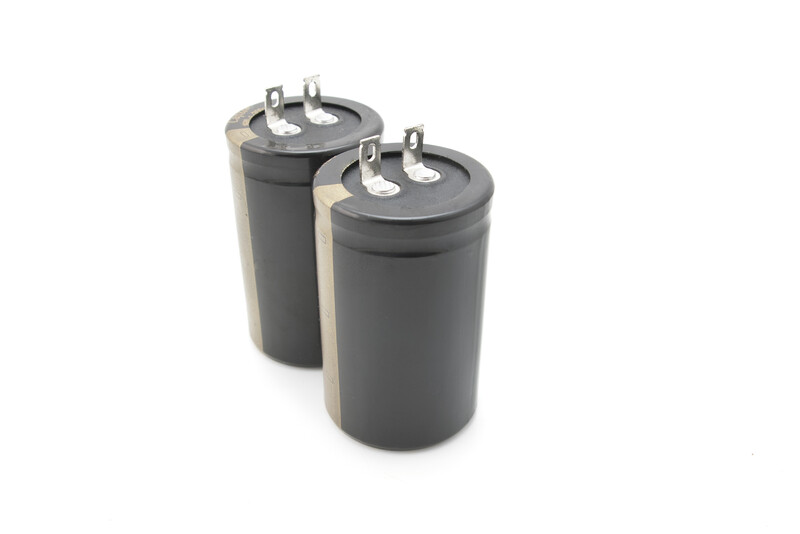It can be hard to ignore when your pool pump is being noisier than usual. In fact, it can be somewhat scary. If you are unsure of what the exact problem is, you may start to worry it could be something you can’t fix. But don’t stress, this article has all the reasons why your pump has become noisy and how to fix it.
The most common reasons for a noisy pool pump include blocked lines, a blocked impeller, faulty bearings and seals or unsecure mountings. The problems cause noises including loud rattling, grinding, gurgling, whining, buzzing, high pitched noises and vibrations. Many pump noises can be fixed in just a few steps.
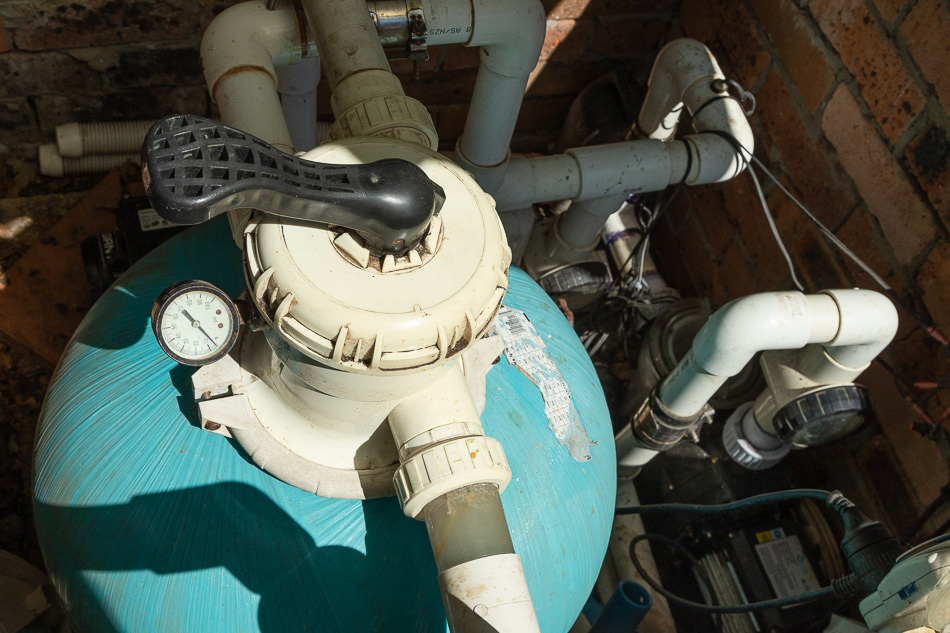
In this article, we’ll give you a full guide on the common noises you may be hearing from your pump, the exact reasons for the noises and even how to fix and prevent these noises in the future. Afterall, nobody wants to be hearing a noisy pool pump all day, especially your neighbors.
Article Contents
6 Common Noises Your Pump Could be Making & Why
Loud rattling – If you’re hearing a loud rattling noise coming from your pool pump, the reason could be a result of a broken impeller. Another possibility is a broken seal somewhere within the pool pump. Or it could be cavitation.
Rocks in Pump – If the pump is making noises like it has rocks rattling around inside it, this is likely cavitation.
Grinding – Grinding noises within the pool pump can be a result of an internal blockage. Sometimes debris can get lodged into the pump causing it to make a grinding noise. This could also be a bearing issue.
Gurgle – A gurgle noise coming from your pool pump could be caused by air leaking into your system even if no water is leaking out. Air could come in from the pump basket lid or could be getting sucked in through the skimmer or other pipes. Gurgling noises can also be a result of not priming your pump correctly.
Whining – If your pool pump is making a whining noise, it is a good idea to check the bearings. If a bad bearing is found, it is best to replace the bearing immediately. All seals should be checked in the system as well.
Buzzing or High-Pitched Noise – Buzzing or high pitched noises could be caused by a bad startup capacitor. A bad capacitor could also result in humming or a system that won’t start.
Vibration – Loud vibrating noises could be a result of a bad mounting for your pump. Or bearing wear or even a partial blockage could be disturbing the flow.
How to Troubleshoot a Noisy Pool Pump & Quiet It
Below you’ll find the steps to take to troubleshoot a noisy pool pump and what you need to do to fix it.
If you own a variable speed pump, it can be more difficult to work on this kind of pump and unless it is something basic, you may need to call a professional to take a look at your pump to alleviate the problem.
1. Ensure Pump is Mounted Properly
A poorly mounted pump can lead to loud vibrations that can be very annoying. To see if the pump is mounted properly, take a look at the pad it sits on. If you detect the noise coming from that area, it is most likely poorly mounted or bad mounting material.
To fix this, ensure your pump is securely mounted to the bed by tightening up the mounting screws.
You can also consider mounting your filter on a vibration isolation pad to reduce noise coming from your pump. Try these products:
| Image | Product | Features | Link |
|---|---|---|---|
 | XCEL Neoprene Anti Vibration Pads
| 9.7 | Check Price |
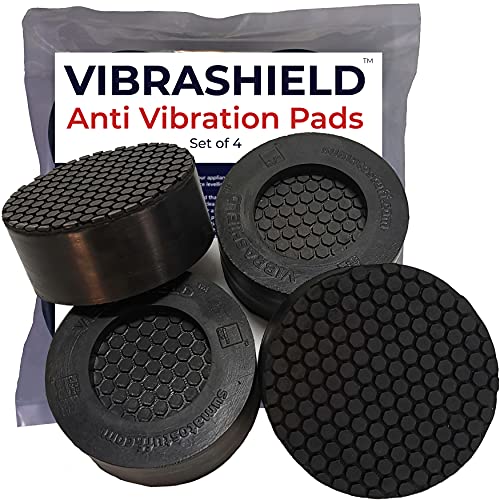 | Vibrashield Anti Vibration Pads
| 9.5 | Check Price |
 | XCEL Rubber Antti Vibration Pads
| 9.1 | Check Price |
2. Look for Bad Bearings
Bad bearings within your pump can lead to whining noises from your system. Bearings are needed to reduce friction in the motor and are susceptible to a lot of wear and tear in the system. They are an extremely common component to go bad. Bearings cannot be lubricated and must be replaced. In some cases replacing the bearings is not possible, and a new pump must be bought.
Before replacing bearings, you can attempt to knock off surface rust by tapping the motor with a hammer. This is not always successful but can be tried before moving on to a full bearing or motor replacement. When replacing bearings, it is important to know that a special bearing puller is needed in order to remove the bearing from the pump.
Pumps typically have two different-sized bearings, so take note of size and locations when removing so you can be sure to replace them with the correct sizes.
You can pick up the bearings and tools at your local pool store.
3. Make Sure Seals Are Intact
Bad seals in your pump can result in gurgling noises. A seal can crack if it gets too hot or due to a lack of water flowing through the pump. When a seal cracks, it can leak a small amount of water on your front bearing, leading to other issues.
Check all seals on your pump to see if they are cracked or broken. Make sure you include the drain plugs and the pump lid. If you discover that you have a cracked seal, you must replace it with a seal of the same exact size. Seals are not universal fits, so be sure to buy a proper replacement.
4. Check for Air Leaks
Air leaks in the pump can be caused by a cracked lid, bad seals, cracked or leaking pipes, incorrect pool water level, improper priming or air coming through the skimmer. Air leaks can lead to gurgling noises coming from your filter. You also may see bubbles in the pool, coming from the jets.
A low pressure reading on the filter pressure gauge could be because you have an air leak. Check out our article here if you have low pump pressure.
When checking for air leaks it is important to check the lid to your pump basket lid. If the lid does not properly seal tight, air could leak into your system. This can also cause issues with correct priming which means a gurgling noise coming from the pump. Tighten the lid and see if the noise goes away.
If it doesn’t closely examine the lid for cracks as air could get into the system that way. If a crack is discovered, the lid can easily be taken off and replaced with a new one. Check the lid seal too.
If a loose or cracked lid is not your problem, a cracked or leaking pipe could be. Take a look at all the pipes coming in and out of the pump and see if you can spot a leak. Ensure you are priming your pump correctly. Improper priming can lead to air leaking into the system when turning it on.
5. Check for Impeller Blockages
Impeller blockages can occur if debris becomes stuck inside the filter and can cause problems. To check if you have an impeller blockage, take a look at your filter pressure. If your pressure is half of what it normally is and the water seems to be moving slowly through the pump, you most likely have a blockage.
To fix an impeller blockage, first turn off your pool pump and remove the pump basket. You will then need to reach into the impeller with your fingers and try to pull the debris out. It may take a few tries to get all of it out, depending on the amount or type of debris that is stuck. If you cannot get it with your fingers, you can try another object such as a long wire or you may have to disassemble the pump in order to get to the blockage. Once you are finished, you will need to prime your pump again before turning it back on.
In order to prevent impeller blockages from occurring, you must make sure the skimmer basket and pump basket are in excellent condition. Missing or damaged baskets can allow for debris being caught in the impeller, impeded water flow and a noisy pump.
6. Skimmer Blockage
Blockages at the skimmer or in the pipes between the skimmer and the pump can also cause pump noises. A blockage between the pool skimmer and the pump (suction side of the system) will cause low pressure.
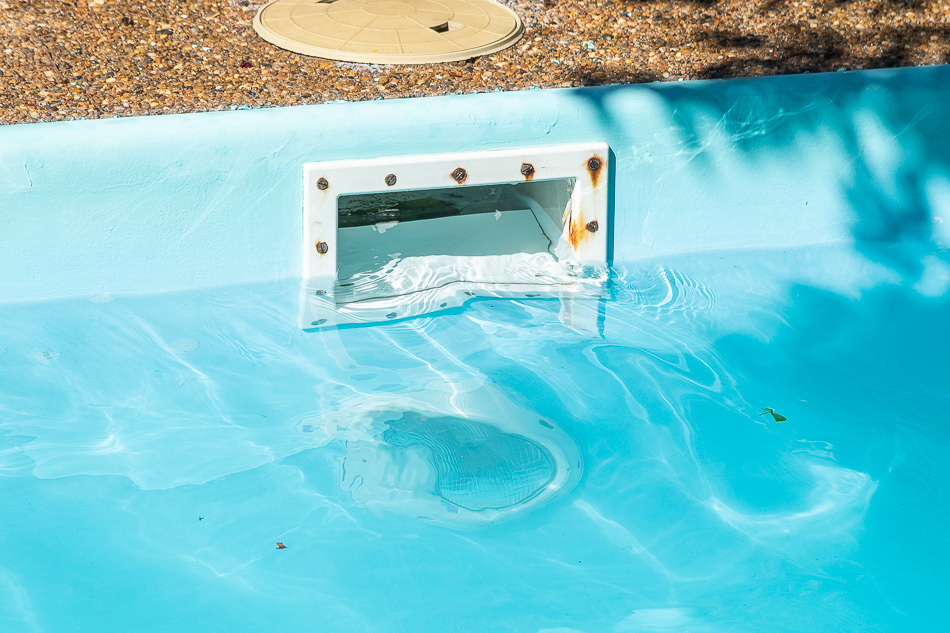
To check this, first take a look at the pressure gauge on your filter to confirm this. If you find the pressure is low you can look for blockages at the skimmer. First turn the pump off and take out the skimmer basket. The basket could be blocked up causing an issue. If the basket is clean, look under the basket for potential debris and blockages. Remove it if you find it. Put the basket back and try the system again.
7. Cavitation
Cavitation sounds like you have rocks rattling around in the pump. If your pump can’t get enough water, the impeller will begin to overheat. When this happens, the pump will start making noises.
The problem could be caused by an air leak on the suction side (between the pump and the pool skimmer box), a blockage on the suction side or you may be running your pump too fast or the pump is oversized. You can try reducing the pump speed slowly if you have a variable speed (VS) pump. The noise should go away as you lower the speed of the pump.
8. Check Startup Capacitors
A motor that is humming or failing to startup is most likely suffering from a bad startup capacitor. To alleviate the issue you will need to replace the startup capacitor. Careful if you do this yourself as motor capacitors hold a charge and can give you a big zap!
If you need to replace the capacitor, you can get one from here:
- Fixes pool/spa motors that won't start
- Fixes intermittent motor starting
- Range fits most pump motors
How to Replace a Pool Pump
If none of the issues mentioned above are the problem or can’t be fixed, it may be time to replace your pool pump. Replacing the pump is easier than you may think.
Step 1
The first step in replacing your pool pump is to determine the pool pump you may need. You can replace your pump with a newer version of the one you already have, or you can try for a Variable Speed pump. Variable speed pumps are a new, quieter pump that is more energy efficient than single speed pumps.
Before replacing your pool pump, make sure your new pump can match your needed flow rate for your pool. You will also need to know the size of the pipe fittings and voltage needed for the pump to operate properly.
Step 2
Before you can install your new pump, you will need to remove your old pump from your pool. Take a picture of your set up in case you need to reference where anything needs to go when installing your new pump. Turn all power to the pool off from the breaker box before removing or installing the pump.
Step 3 –
Disconnect all wiring from the old pump and remember how it was set up. If you bought the same pump as the one you are replacing, it will be wired the exact same way.
Step 4
Relieve pressure from your system before disconnecting or cutting the pipes. To do this, turn the relief valve located on your filter counterclockwise until your pressure valve drops to zero.
Step 5
If you’re lucky you can just disconnect the pipes. If the new pump is different you may need to reroute the pipes slightly.
Determine where you want to cut the pipes so that you can remove the pump. You can use a PVC pipe cutter or a hacksaw to accomplish your cut. Be sure not to leave yourself some room on the pipe because you will need to add a union to attach the new pipes to the existing pipes.
Step 6
Remove the old pump and clean existing pipes to get them ready for gluing.
Step 7
Place the new pump exactly where the old pump was. If the new pump is not the same size, you may need to make some height adjustments so that the pipes will connect properly.
Step 8
Connect the suction side of the pump up first. Seal the joint with Teflon tape and screw the threaded end of the fitting into the pool pump and be sure not to over tighten the fitting when screwing it in.
Step 9
Apply primer to the outside of the cut pipe and on the inside of one side of the union. Apply a thin layer of glue to the same places once the primer is dried. Immediately connect the union to the pipe and turn to spread the glue. Let dry.
Cut a new pipe to attach from the union to the pump. Screw the union collar onto the threads to complete the connection. Repeat to this process for the discharge pipe.
Step 10
Connect the wiring for the new pump. Incorrect wiring could result in injury or death or a blown pump. Only do this part yourself if you are comfortable doing so, otherwise call an electrician to connect them for you.
Step 11
Before turning the pool pump back on, wait two hours to allow for the pipe glue to dry (if you used it). Prime the pump by filling the pump basket with water and closing the pump basket lid. Turn the power on and close the relief valve to finish priming the pump.
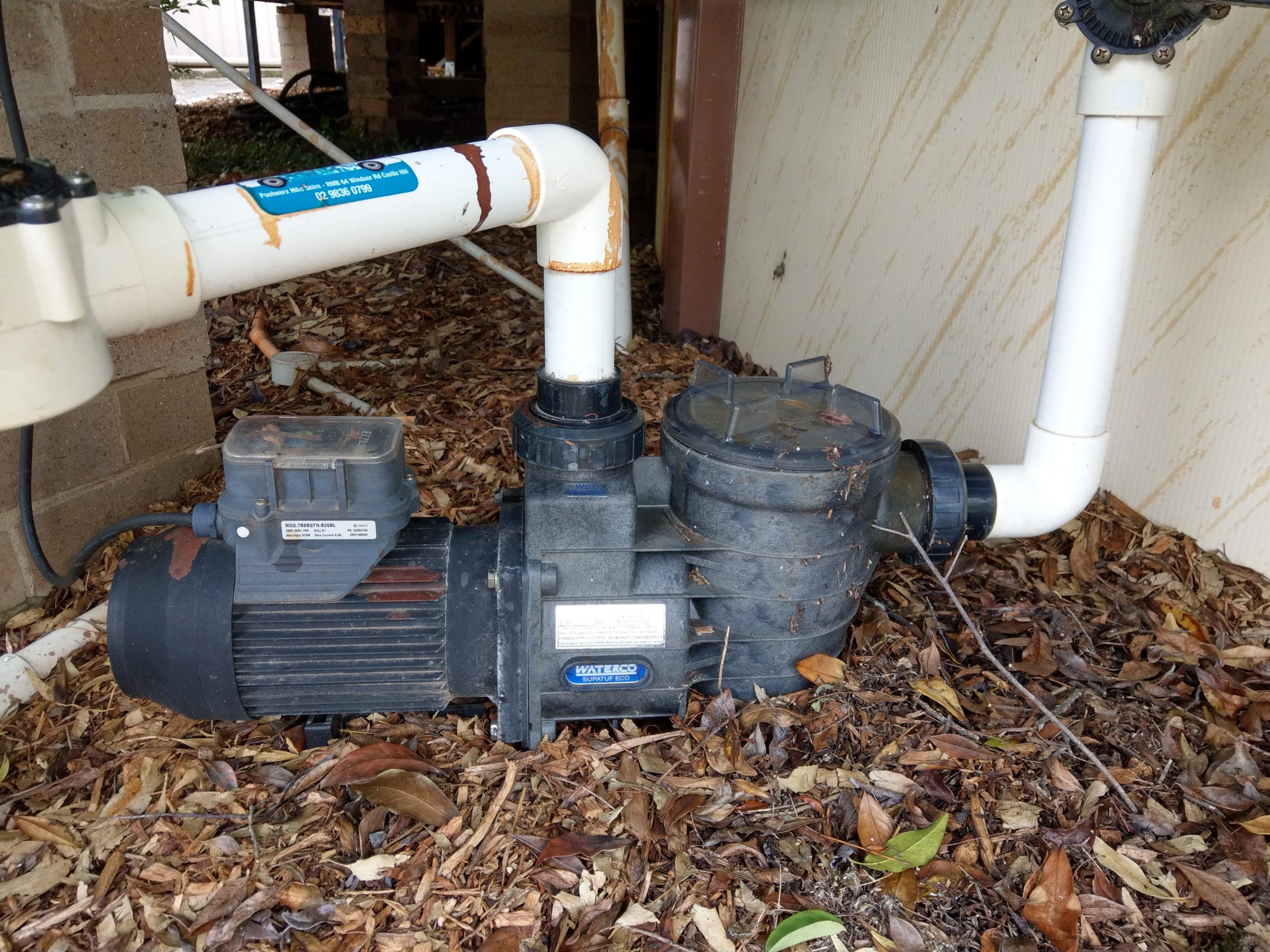
Tips to Maintain a Quiet Pool Pump
To keep your pool pump running quiet and at peak condition here is a list of tips you can use.
1. Repair any leaks from seals or joints to prevent water from getting to the motor and prevent failure of bearings.
2. Replace any failed bearings immediately. Failure to do so can result in the motor overheating. In addition, remember to always replace the pump seal when replacing bearings.
3. Store chemicals away from the motor. Even if chemicals don’t come in direct contact with the motor, they can still cause corrosion of the motor if nearby.
4. Never use a hose to clean a pump. Spraying the pump with water could flood the motor and lead to damage. Use a cloth if needed to wipe away any dirt on the pump.
5. Keep dust and debris away from the motor to keep it running smoothly. If you need to sweep around the motor, make sure the motor is off and use a wet/dry vac or a broom and sweep away from the pump.
6. Regularly clean out the pump basket and also your skimmer baskets.
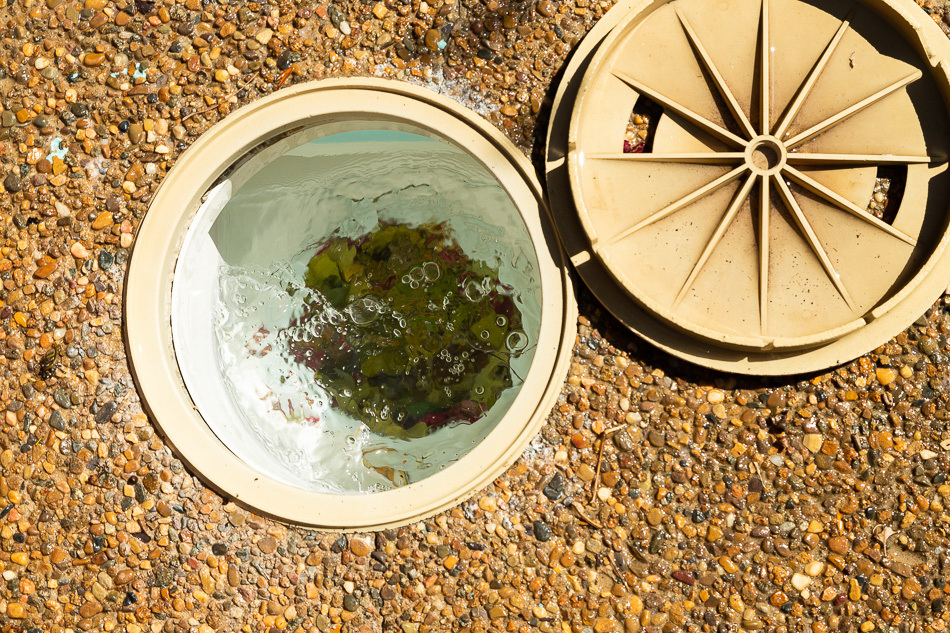
7. Backwash your pool filter regularly. A blocked filter means the pump needs to work harder.
8. If the motor is to be turned off for an extended period of time, such as the Winter, make sure all parts of the pump are dry before moving the pump inside or covering it for the season. This will ensure the pump does not get corroded. When starting the pump back up, make sure the seal is wet by flooding the suction.
Related Reading: 6 Reasons Why Your Pool Pump is Surging or Pulsing (And Fixes)
Final Thoughts
To wrap it all up, your pool pump can make lots of different noises, but if you pay close attention, you can pinpoint and fix the problem without much hassle at all. The best way to ensure your pump is running smoothly is to make sure it is free of debris, check frequently for leaks, cracks and blockages within your system, and maintain proper water flow.
Related Reading:
How to Hide Pool Equipment in Your Yard
Why Your Hot Tub Pump is Noisy & How to Fix It (Quieten it)
How Do You Know If Pool Pump Shaft Seal Is Bad?

